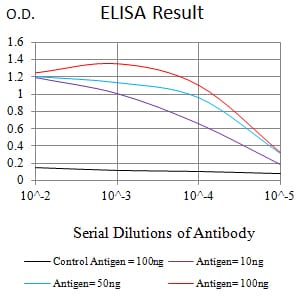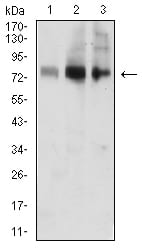

| WB | 1/500 - 1/2000 | Human,Mouse,Rat |
| IF | 咨询技术 | Human,Mouse,Rat |
| IHC | 咨询技术 | Human,Mouse,Rat |
| ICC | 技术咨询 | Human,Mouse,Rat |
| FCM | 咨询技术 | Human,Mouse,Rat |
| Elisa | 1/10000 | Human,Mouse,Rat |
| Aliases | ACAS2L; ACECS1; AceCS2L |
| Entrez GeneID | 84532 |
| clone | 4E12F1 |
| WB Predicted band size | 74.8kDa |
| Host/Isotype | Mouse IgG1 |
| Antibody Type | Primary antibody |
| Storage | Store at 4°C short term. Aliquot and store at -20°C long term. Avoid freeze/thaw cycles. |
| Species Reactivity | Human |
| Immunogen | Purified recombinant fragment of human ACSS1 (AA: 548-689) expressed in E. Coli. |
| Formulation | Purified antibody in PBS with 0.05% sodium azide |
+ +
以下是关于ACSS1抗体的3篇参考文献及其摘要信息:
1. **文献名称**: "ACSS1 regulates mitochondrial homeostasis and lifespan via a network of NADH-sensitive protein modifiers"
**作者**: Bulteau, A. L., et al.
**摘要**: 该研究利用ACSS1抗体进行免疫组化及Western blot分析,发现ACSS1通过调控线粒体NADH水平影响氧化应激反应,其表达下调与阿尔茨海默病模型中的神经元退行性变相关。
2. **文献名称**: "Acetyl-CoA synthetase 1 (ACSS1) mediates the acetate-dependent PD-L1 expression in cancer cells"
**作者**: Schug, Z. T., et al.
**摘要**: 研究通过ACSS1抗体检测肿瘤细胞中ACSS1的蛋白表达,揭示了ACSS1通过代谢乙酸盐促进PD-L1表达,从而影响肿瘤免疫逃逸的分子机制。
3. **文献名称**: "Tissue-specific regulation of acetyl-CoA synthesis by ACSS1 and ACSS2 in dietary obesity"
**作者**: Li, X., et al.
**摘要**: 该研究利用ACSS1特异性抗体分析小鼠肝脏和脂肪组织,发现ACSS1在高脂饮食诱导的肥胖模型中通过调控乙酰辅酶A合成,影响脂质代谢和胰岛素敏感性。
4. **文献名称**: "Subcellular localization and functional characterization of ACSS1 and ACSS2 isoforms"
**作者**: Yoshii, Y., et al.
**摘要**: 通过ACSS1抗体的免疫荧光技术,研究确认其线粒体定位,并发现ACSS1与ACSS2在亚细胞分布及代谢功能上的差异,强调了ACSS1在能量稳态中的作用。
这些文献均通过ACSS1抗体在分子机制、疾病模型或代谢调控研究中提供了关键实验证据。
The ACSS1 (acyl-CoA synthetase short-chain family member 1) antibody is a research tool used to detect and study the ACSS1 protein, an enzyme critical for cellular metabolism. ACSS1 catalyzes the conversion of acetate into acetyl-CoA, a key substrate in lipid synthesis, energy production, and histone acetylation. This enzyme is primarily localized in mitochondria, where it links acetate metabolism to the tricarboxylic acid (TCA) cycle, particularly under low-glucose conditions. Dysregulation of ACSS1 has been implicated in metabolic disorders, cancer, and neurodegenerative diseases, making it a target for therapeutic and diagnostic research.
Antibodies against ACSS1 enable researchers to investigate its expression, localization, and function in tissues or cell lines. They are widely used in techniques like Western blotting, immunohistochemistry (IHC), and immunofluorescence (IF). Validated antibodies help identify ACSS1’s role in diseases; for example, reduced ACSS1 levels correlate with mitochondrial dysfunction in neurodegenerative conditions, while its overexpression in certain cancers may drive tumor growth via altered acetyl-CoA availability. Researchers also utilize these antibodies to explore ACSS1’s interaction with metabolic pathways or epigenetic regulators, such as histone acetyltransferases. Specificity and cross-reactivity validation are essential, as ACSS1 shares structural homology with other acyl-CoA synthetases. Overall, ACSS1 antibodies are vital for advancing studies in metabolism, oncology, and neurology.
×